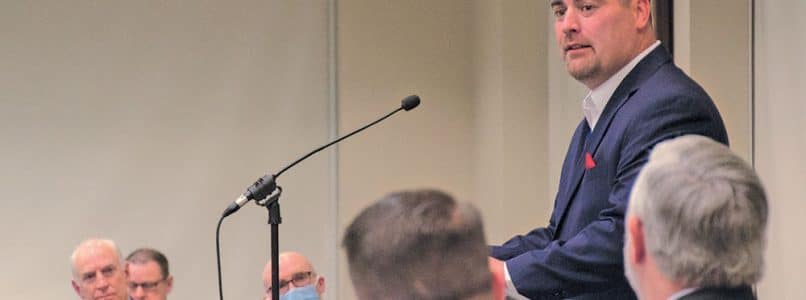The Southern Baptists of Texas Convention Executive Board, in a special meeting at the convention’s Grapevine offices on Sun., Feb. 21, voted unanimously to confirm Nathan Lorick as the SBTC’s second executive director, succeeding Jim Richards.
Mark Hogan, SBTC executive board and search committee chairman, called the meeting to order and introduced guests, including Lorick’s parents and wife, Jenna. SBTC senior staff were also present.
The roll call revealed 12 board members attending via Zoom.
“I personally never have been part of a group, men and women, where I felt the presence of God so powerful and so present, every time we had a meeting and a call,” Hogan said, thanking the search committee for its efforts and all board and staff for their prayers over the last three months of the search.
Caleb Turner, search committee vice chair and assistant pastor of Mesquite Friendship Church, formally presented Lorick’s nomination.
Hogan praised the efficiency of the search committee, which began meeting immediately after Richards formally announced, Nov. 11, that he would be stepping down.
“We were able to hit the ground running,” Hogan recalled, inviting the committee to join him at the podium and give their reasons for Lorick’s selection.
Kie Bowman, SBTC president and pastor of Austin’s Hyde Park Baptist Church unable to attend the meeting because of car trouble, spoke first via Zoom.
Although he had no preconceived choice for Richards’ successor, Bowman said that during the interview process it became “obvious” that “Lorick was the man. He is smart. He is passionate about evangelism. He has a phenomenal mentoring relationship with Jim Richards. He knows the Southern Baptists of Texas Convention which will make the transition … as smooth as only God can make it and heaven can arrange it.”
Carol Yarber of Athens, one of three lay persons on the search committee, recalled Lorick’s time as her pastor at First Baptist Malakoff. Yarber praised Lorick as a man of “integrity” and a “visionary” who took a church of 120 to almost 500.
Of Lorick’s selection, Yarber said, “God did this, we did not do this,” explaining that after numerous meetings and the consideration of many resumes, search committee members were asked to narrow their choices to three candidates.
“We all came back with one,” Yarber said, “Nathan Lorick.”
Search committee members Todd Kaunitz, pastor of Longview’s New Beginnings Baptist Church; Loui Canchola of McAllen’s Baptist Temple; Robert Slavens, a layman from Houston’s First Baptist, and Nathan Lino, pastor of Northeast Houston Baptist church, also praised the choice of Lorick.
Richards, who served as an ex officio non-voting search committee member, thanked the men and women for their work.
“It was a joy to watch them as a silent participant,” Richards said.
Richards lauded Nathan as convictional regarding the Baptist Faith and Message 2000 and biblical inerrancy, compassionate for the lost and believers alike, and capable in terms of skill set and life experience.
He then read the account of Moses and the commissioning of Joshua from Numbers 27, before inviting Lorick to speak.
Lorick began by acknowledging his wife and family.
“I am humbled,” Lorick opened, before describing his salvation as a child and recommitment to Christ at 17 after a time of “running from God.”
Later, at 24 he became one of the youngest pastors in the SBTC and soon served on the executive board.
“Even if you choose not to call me, this process has been the greatest honor of my ministry,” Lorick told the board.
Lorick was called shortly after by a unanimous vote of the executive board and greeted by a standing ovation.
“I never thought it would be possible to be able to follow your hero,” Lorick said of Richards after accepting the appointment, telling the outgoing director and his wife, June, “I am forever changed because of you two.”
“I still have a lot to learn. You’ll be on speed dial,” he added.
Lorick said in closing, “I’m humbled. I’m honored. … I can’t wait to be home.”
Lorick will become SBTC executive director-elect on April 1 and serve under Richards for three months before becoming executive director, according to a succession plan approved by the board last year. Richards will continue in an advisory role through the remainder of 2021.
For Lorick, executive director of the Colorado Baptist General Convention since 2017, the new role heralds a return to Texas and the SBTC, where he served as evangelism director from 2012-2017. In addition to ministering in multiple Baptist churches in Texas as a student pastor and interim pastor, he was also senior pastor of First Baptist Church of Malakoff and Martin’s Mill Baptist Church.
A graduate of East Texas Baptist University, Lorick earned Masters of Divinity and Doctor of Ministry degrees from Liberty University Baptist Theological Seminary (now the Rawlings School of Divinity). In addition to his pastoral ministry, Lorick has been active in denominational work, including serving on the SBTC Executive Board from 2006-2012 and as a trustee of the International Mission Board from 2010-2017.
In comments to the TEXAN prior to the Feb. 21 vote, Richards said of his successor’s appointment: “Nathan Lorick is a man who has been prepared by God’s gracious providence to lead the Southern Baptists of Texas Convention. I have watched him as a young minister, observed him when he was an executive board member and now joyfully transfer the mantle of leadership on his shoulders.”
In endorsing Lorick for the SBTC position, Calvin Wittman, who chaired the search committee that brought Lorick to Colorado in 2017, commended the candidate’s blend of pastoral and convention experience that enabled him to understand “how a state convention should operate” and “how pastors think, lead and respond to the state conventions.”
In comments to the TEXAN prior to his election, Lorick said he was “excited to come back and serve the churches of the SBTC.” Acknowledging the significance of the task ahead, he expressed confidence that “with the help of the Holy Spirit, a great team, and the partnership of churches … great days are ahead for the SBTC” and expressed gratitude to the search team, executive board, Richards and SBTC churches.
Saying he was “eager to start the journey together,” Lorick added, “I believe we have yet to see what God can do when we are unequivocally focused on the mission together. It is my conviction that through prayer, evangelism, church planting, and the Cooperative Program, the SBTC is poised to see an advancement of the gospel across Texas like we have never seen before.”














